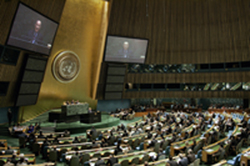Space Law and Policy
 Development of Policy and Law for Space Activities
Development of Policy and Law for Space Activities
To achieve sustainability, space activities need to rest on sound policies and clearly formulated international agreements, laws, and codes. States also need to develop national laws in order to foster responsible behavior by State agencies and private sector entities.
Why Is It Important?
- The development and/or strengthening of international norms related to space activities is essential to a sustainable space future. The 1967 Treaty on Outer Space and the later three international agreements on the return of astronauts and spacecraft, liability for damage, and registration of space objects have served the space-faring States well in governing space activities. However, given the increasing number of States entering the outer space arena and the increasing threat of orbital debris, additional "rules of the road" implemented at both the national and international levels will be needed.
- National space policies set the focus and direction of a State's space efforts. Space policy is generally considered as a subset of overall science, technical, and industrial policies. Hence, the space policy of a country generally includes basic principles such as:
- Supporting the development of science and technology
- Providing for the national security
- Supporting education in science and technology
- Because of the fundamentally international character of space activities, a State's stance towards outer space activities must also include consideration of its relationships with other States and international organizations. There are several major principles for consideration in the development of a sound space policy, such as:
- Ratifying the 1967 Treaty on Outer Space and later international agreements;
- Incorporating treaty provisions into State law and regulations;
- Taking active part in the United Nations Committee on the Peaceful Uses of Outer Space (COPUOS) and its subcommittees;
- Contributing constructively to other international space-related organizations;
- Taking an active role in assuring the long-term sustainability of outer space;
- Adhering to the United Nations Orbital Debris Guidelines.
- According to Article VI of the Outer Space Treaty, "States Parties to the Treaty shall bear international responsibility for national activities in outer space, including the Moon and other celestial bodies, whether such activities are carried on by governmental agencies or by non-governmental entities…" Because of this responsibility, States have a duty to regulate the space activities of private actors through national regulation and licensing.
Challenges to Policy and Law Development
Because space systems are often embedded in a State's arrangements to protect national security, these systems may be a target for conflict. States need to consider what legal instruments might contribute to the avoidance of international conflict. In particular, it is in all States' interest to develop a series of transparency and confidence building measures (TCBMs) for space that might reduce the chances of mishaps, misperceptions, and mistrust.
States have considered development of anti-satellite weapons (ASATs) and ASAT tests have been conducted by the Soviet Union, the United States, and China. Because all space systems, whether civil or military, are subject to the threat of damage from orbital debris, States need to consider what international norms, laws, and agreements may be needed to protect all space systems.
What is SWF Doing to Promote Policy and Law Development?
SWF supports the development of sound space policy, the incorporation of international legal principles in national policy and laws, and the strengthening of international norms of responsible behavior in space activities.
Facilitating Dialogue and International Cooperation
- Preventing Mishaps, Misperceptions, and Mistrust in Space requires transparency and confidence building measures (TCBMs) as well as an understanding of the space environment and threats to space sustainability. SWF works in international forums to explore methods to improve transparency, build confidence and trust, and enhance understanding of the space environment.
Promoting Development of Space Policy and Law
- Development of Multilateral Mechanisms for Governing Space Activities is supported by both formal and informal processes through the United Nations Committee on the Peaceful Uses of Outer Space (COPUOS) and the Conference on Disarmament, as well as other diplomatic initiatives. All have the potential to contribute to international norm-building and agreements that improve the chances for space sustainability.
Increasing Awareness and Knowledge
- Emerging Space States must often start from scratch when it comes to expertise and capacity in space policy and law. SWF works with organizations and governments to inform them about best practices in space law and policy.

 Share
Share